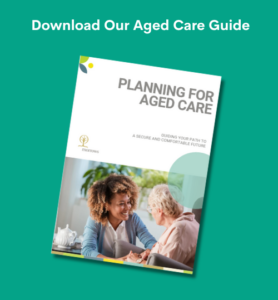Significant changes are coming to Australia’s aged care system from 1 July 2025, aimed at creating a more sustainable and equitable model of care. While the reforms promise long-term benefits, they also bring new terminology, cost structures, and potential financial implications for individuals and families.
Here are five key updates you need to be aware of:
1. Aged care will cost more – but remains subsidised
From July 2025, individuals entering residential aged care can expect to contribute more toward their care costs. While the Australian Government will continue to cover a significant portion (around 73% on average), careful planning will be required to manage the impact on personal cashflow and assets.
2. New fee names and calculations will apply
The way fees are described and calculated is changing. The familiar “means-tested care fee” will be replaced by new terms such as:
- Hotelling Contribution
- Non-Clinical Care Contribution
Although contributions will still be based on your income and assets, the new formulas could mean higher fees for some residents compared to the current system.
3. Lifetime caps will continue – but increase
A lifetime cap will still limit the total amount payable for non-clinical care services. This cap will increase to $130,000, with a new protection in place: residents will only pay this fee for a maximum of four years, regardless of how long they remain in care. This change is designed to support fairness across households with different financial means.
4. Retention amounts are being reintroduced
If you opt to pay for your room via a Refundable Accommodation Deposit (RAD), aged care providers will once again be allowed to deduct a “retention amount” of up to 2% per year, capped at 10% over five years. While this represents a modest additional cost, it may still offer better long-term value than daily accommodation payments for some families.
5. Getting the right advice can save you time, money, and stress
Aged care financial decisions often intersect with sensitive family issues, pension eligibility, and real estate matters. The rules can be complex — and mistakes can be costly. Working with a specialist adviser ensures you’re making informed, confident decisions aligned with your family’s needs and values.
We’re here to help
Planning ahead is key. Whether you’re preparing for a future transition or facing immediate aged care decisions, Morrows is here to guide you every step of the way.
We’ve prepared a comprehensive Aged Care Guide to help you better understand your options and obligations. We also invite you to book in for a one-hour aged care information session with our experienced aged care financial advisors.
Get in touch today to request your copy of the guide or to schedule your session — and take the first step toward peace of mind for you and your loved ones.
IMPORTANT INFORMATION: The information is general only and has been prepared without consideration of your individual objectives, financial situation or needs. Before making any decisions, you should consider the appropriateness of your personal investment objectives, financial situation or individual needs. We recommend you speak to your financial adviser, registered tax agent or legal adviser before making any decisions based on this information.

Emma Stoffels

Download Our FREE Aged Care Guide!
To understand more about the aged care process, the fees and key considerations, complete the form below to access our Aged Care Planning Guide.
If you need further assistance, please reach out, our Morrows Advisors are more than happy to help you and your loved ones.



